STATEHOUSE REPORT | ISSUE 20.53 | DEC. 31, 2021
MY TURN, Copps: Hollings was a model public servant
NEWS BRIEFS: New journalism nonprofit to help S.C. weekly newspapers
LOWCOUNTRY, Ariail: Best cartoons of 2021
COMMENTARY, Brack: Government works for us
SPOTLIGHT: S.C. Hospital Association
FEEDBACK: “Common good” talk is nothing but liberalism
MYSTERY PHOTO: Another old white house
 DONATE: We’re proud to offer Statehouse Report for free. For 20 years, we’ve been the go-to place for insightful independent policy and political news and views in the Palmetto State. And we love it as much as you do. But now, we can use your help. If you’ve been thinking of contributing to Statehouse Report over the years, now would be a great time to contribute as we deal with challenges thanks to the pandemic. In advance, thank you.
DONATE: We’re proud to offer Statehouse Report for free. For 20 years, we’ve been the go-to place for insightful independent policy and political news and views in the Palmetto State. And we love it as much as you do. But now, we can use your help. If you’ve been thinking of contributing to Statehouse Report over the years, now would be a great time to contribute as we deal with challenges thanks to the pandemic. In advance, thank you.
Hollings was a model public servant

Editor’s Note: The following is an opinion piece by former FCC Commissioner Michael J. Copps giving a perspective about the importance of a lifetime of public service by the late U.S. Sen. Fritz Hollings, D-S.C.
By Michael J. Copps | The late U.S. Sen. Fritz Hollings, D-S.C., would have been 100 years old on New Year’s Day. I worked for him for 15 years and knew him as a friend for 50. For me, he was a model of what a public servant should be—dedicated to moving his beloved South Carolina and his country forward, committed to straight talk with his constituents, and possessed of a knack for policy and politics that was both visionary and practical. He had an almost intuitive feel for policy and politics the likes of which I have never encountered; it was in his brain and in his gut. His brilliance, humor and commanding personality made him the most impressive man I ever met.

Graduating from The Citadel in the famous Class of 1942, young Fritz went straight into World War II, winning a Bronze Star and seven combat stars as he fought across North Africa and Europe. Returning home, he garnered a law degree in just two years. Soon thereafter the 26-year-old up-and-comer was asked to run for the South Carolina House. He quickly became Speaker Pro Tempore, and then was elected lieutenant governor. By age 37, he was governor of the state. He traveled the nation recruiting hundreds of millions of dollars in business investment for new jobs in South Carolina. His visionary technical education program became a model for other states. Educational television (SCETV), teacher pay raises of 38 percent over his term-limited four years, and a Triple-A credit rating for the state budget were other highlights of his governorship.
As current U.S. House of Representative Majority Whip James Clyburn, D-S.C., eloquently noted at Hollings’ funeral in 2019, Fritz had an amazing capacity for growth, and he grew to be a leader for equal opportunity and civil rights. In a history-making gesture in 2015, Hollings asked that his name be removed from the federal courthouse in Charleston and proposed that it be named instead for former federal Judge J. Waties Waring, a pioneering civil rights jurist whose decisions had played a major role in setting the stage for Brown v. Board of Education. At Hollings’ request, congressional legislation was passed and the building’s name was changed. To the best of my knowledge, no sitting or retired senator had ever asked for removal of their name from a federal building. That said a lot about Fritz.
He was, of course, known for his quick wit and witticisms. “When in danger, when in doubt, run in circles, scream and shout” he would say about certain politicians. “The ox is in the ditch,” when the nation encountered tough sledding. “There’s no education in the second kick of a mule.” “A man convinced against his will is a man of the same opinion still.” “On the way through life make this your goal—keep your eye on the doughnut and not the hole.” There were scores more which would take a small book to recapture. On occasion, a particularly pungent utterance would get him into trouble. But Fritz, being Fritz, said what he thought.
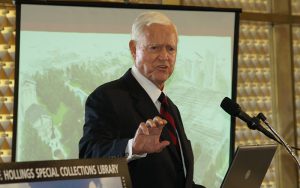
While often humorous, Fritz Hollings was a serious man engaged in serious business. He dove deeply into every issue. I know, because I was there. And what an amazing record of legislative accomplishment came out of his leadership. The National Oceanic and Atmospheric Administration, coastal zone management, protection of marine mammals and fisheries, the Ocean Dumping Act, funding for cancer research and other health priorities, building stronger national defense, the Automobile Fuel Economy Act, telecommunications legislation, and strengthened port and airport security, are just some of the issues on which he led. His widely-read 1970 book, The Case Against Hunger, played an important role in focusing attention on the need for nutritional and anti-poverty programs like Women, Infants and Children Feeding. Education was another Hollings priority: “The only way we can raise the income level of any is to raise the education of all.” He fought mightily to limit campaign spending, convinced that the untoward role of big money was undermining our elections and corrupting democracy. No one spoke more candidly about this continuing challenge.
Fritz believed that office-holding brought with it the duty to really learn about issues and to share what he learned with his constituents. I seldom saw him go off for the weekend without a serious book tucked into his briefcase. He was not a man for 30-second soundbites that obscured issues. Instead, he traveled the state explaining what the challenges really were, and he wrote regular fact-filled newsletters to keep his fellow citizens informed. Even when some people disagreed with him on an issue, they knew they were being treated as mature citizens by a leader for whom integrity truly mattered.
Fritz had a great appreciation and love for those who worked for him during his many years of public service. He wasn’t just our boss, but our friend, too.
We should do more today than just commemorate his centenary. We should seek out and find more leaders like Fritz Hollings who put the common good first.
Michael J. Copps, a former commissioner with the Federal Communications Commission, served as Hollings’ chief of staff from 1974 to 1985. He currently is a senior advisor with Common Cause in Washington, D.C. Have a comment? Send to: feedback@statehousereport.com
- Have a comment? Send to: feedback@statehousereport.com.
New journalism nonprofit to help S.C. weekly newspapers

Staff reports | The South Carolina Institute for Independent Journalism is a new nonprofit dedicated to supporting reporting projects for the state’s weekly newspapers.
“Independent local journalism is under threat today,” said George Stevens, a Charleston nonprofit leader who is chairing the new organization. “Good, solid journalism in communities across the country leads to better democracy. Weekly newspapers serve as watchdogs on government and provide residents with information to help them make more connections in their community, which improves everyone’s quality of life.”
More than 1,800 newspapers have closed across the country in the last 17 years, said Andy Brack, publisher of the Charleston City Paper, which helped to spearhead efforts to form the new nonprofit.
“The lack of a locally focused news outlet erodes forces that keep a community cohesive and give residents the sense of being connected and belonging,” Brack wrote two weeks ago in a Statehouse Report commentary syndicated across the state.
A national report on the decline of newspapers highlighted how they drive civic engagement.
“Studies show citizens are less likely to vote, less politically informed and less likely to run for office,” when there is less local news, according to PEN America. “There also are fewer watchdogs looking at what local government does, which leads to less accountability, integrity, efficiency and effectiveness. Furthermore, other studies show the lack of local news leads to the likelihood of more corruption, which can lead to increased government costs for taxpayers.”
The mission of the S.C. Institute for Independent Journalism is to support the development and production of independent and nonprofit weekly news in South Carolina to promote democratic ideals.
According to its website, “SCIIJ will achieve its mission by providing financial and organizational support to community publications; operating civic engagement initiatives; training promising journalists; and producing bold independent journalism.”
- For more information, visit the site.
- Donate to the nonprofit. Donations are tax-exempt to the extent provided by federal law.
In other recent news:
![]() S.C. House releases another proposed congressional map, still gets criticism. The South Carolina House has released another map for redrawing congressional voting districts in the state — this time the map mirrors the Senate’s version but also still would likely keep the state electing six Republicans and one Democrat to Congress. Both proposed maps are still being considered by the House Redistricting Committee. More: AP News, The Post and Courier, WISTV
S.C. House releases another proposed congressional map, still gets criticism. The South Carolina House has released another map for redrawing congressional voting districts in the state — this time the map mirrors the Senate’s version but also still would likely keep the state electing six Republicans and one Democrat to Congress. Both proposed maps are still being considered by the House Redistricting Committee. More: AP News, The Post and Courier, WISTV
State works to keep new teachers from fleeing profession. In 2021, school districts in South Carolina reported fewer early career teacher departures compared to 2020. More: WSPA
Long lines seen at COVID-19 testing sites. Hospitals are already reporting a post-Christmas surge in the Pee Dee and testing sites in the Lowcountry have experienced long lines. Other experts in South Carolina are warning that New Year’s Eve celebrations could cause a further spike. More: WCSC, WPDE. As of Thursday, the percentage of positive tests was more than 20 percent – a sure sign the Omicron variant is causing havoc.
- Want more headlines every business day that are like this? Visit our friends at SC Clips.
Best cartoons of 2021
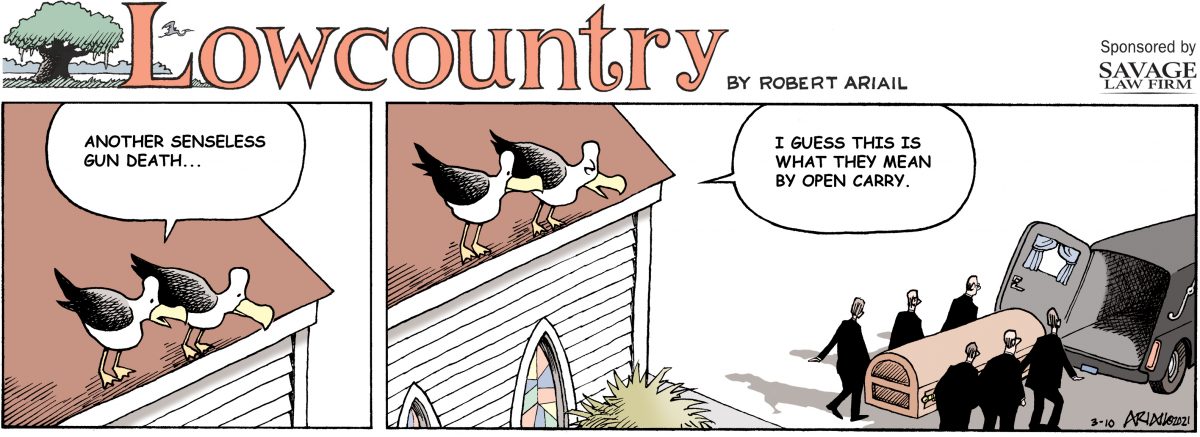
Cartoonist Robert Ariail always has an interesting take on what’s going on in South Carolina. Here are his picks for best cartoons of 2021 from his weekly “Lowcountry” strip. What do you think: feedback@statehousereport.com.
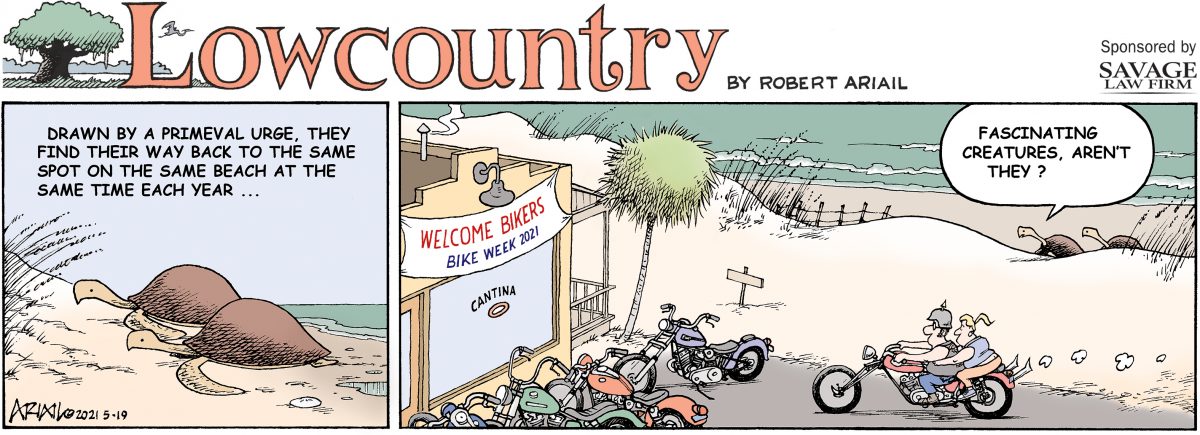
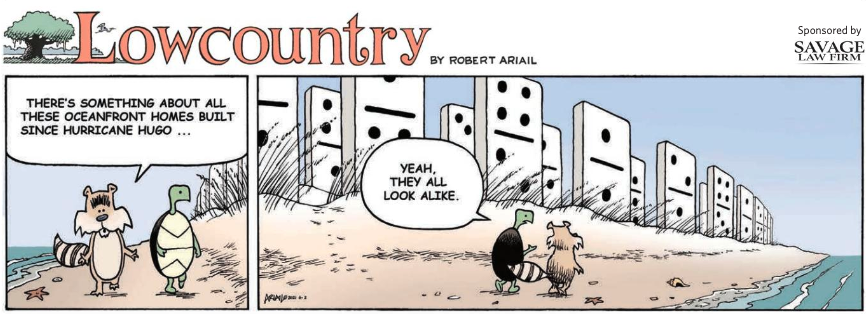
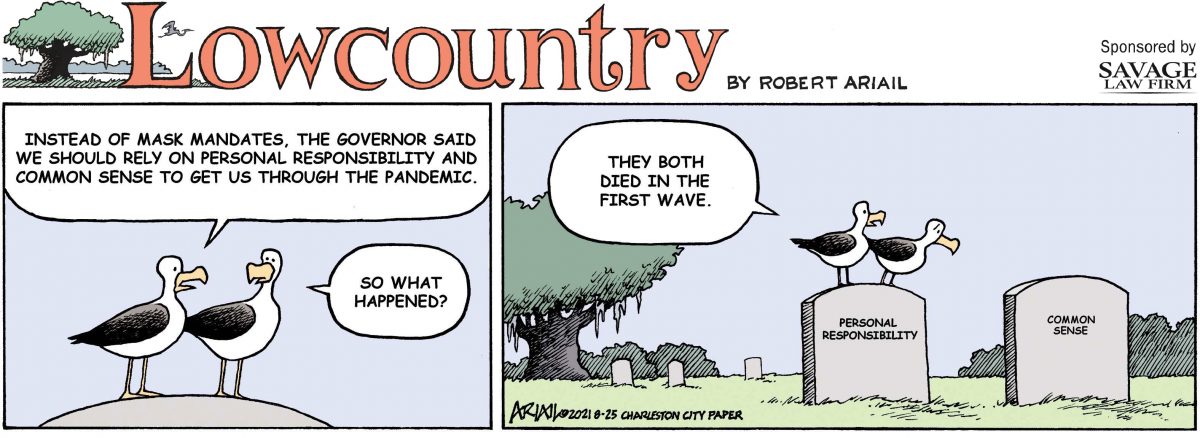

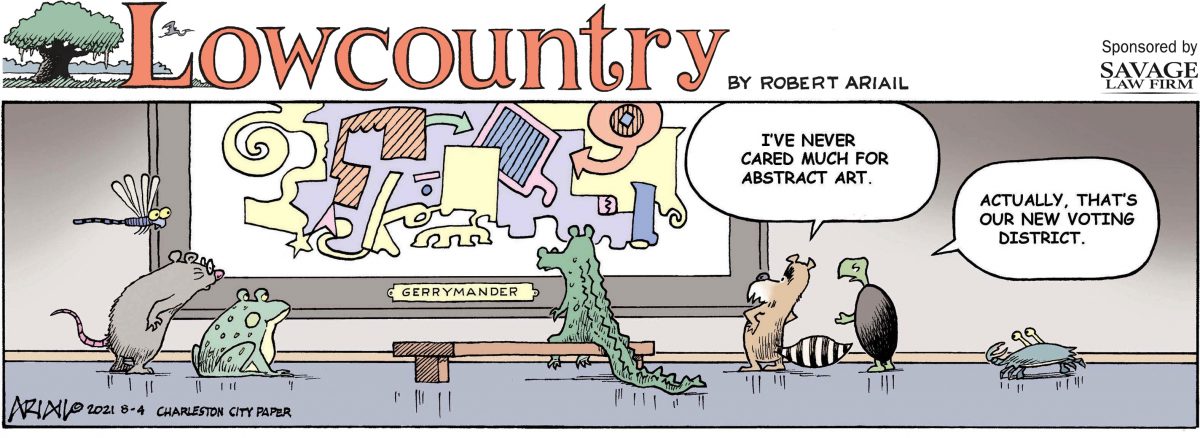
Government works for us

By Andy Brack, editor and publisher | A reader from Hartsville complains a recent column on improving common good was little more than a promotional campaign that is “leftist, liberalistic, socialistic.”
 “It seems most of your writing is in favor of the government taking care of people that (sic) won’t take care of themselves,” wrote Marshall Brand of Hartsville. His prescription for people to stay out of poverty: “Stay in school. Work hard at a job. Don’t have kids. Don’t drink. Don’t do drugs. Don’t join a gang. Don’t break the law.”
“It seems most of your writing is in favor of the government taking care of people that (sic) won’t take care of themselves,” wrote Marshall Brand of Hartsville. His prescription for people to stay out of poverty: “Stay in school. Work hard at a job. Don’t have kids. Don’t drink. Don’t do drugs. Don’t join a gang. Don’t break the law.”
Ahh, only if it were only so simple. But it’s not. People are complex. Furthermore, those solutions are based on a moral code rooted in individualism and don’t take into account how diverse people actually live in interconnected communities.
Government’s role isn’t to “take care of people.” Rather, government works for us to create opportunities, provide protection, promote solutions to support the common good, and help us live and work at a standard of living that’s beyond subsistence farming.
Take roads. Without the government, would we have a robust system of roads and bridges that allow trucks to transport goods throughout the nation to keep our economy humming? Can you imagine such an economic engine without the infrastructure support of the government? It wouldn’t be there.
Without our government, 50 million seniors wouldn’t have Social Security or Medicare to help them pay bills and get health care. Without the government:
- There wouldn’t be national parks.
- Public education wouldn’t be guaranteed.
- College loans wouldn’t be widely available, which would keep average Americans from having the chance to get more education.
- Bank deposits wouldn’t be guaranteed and safe, and any losses due to ATM theft wouldn’t be limited.
- Intellectual property wouldn’t be protected through copyright, trademark and patent laws, which would be a drain on the economy.
- The nation’s supply of meat wouldn’t have regulated inspections, making it potentially unsafe.
- Lots of kids wouldn’t get school lunches and wouldn’t learn as much as they could. Hungry kids have a tougher time learning, as we learned 50 years ago in the late Sen. Fritz Hollings’ book, The Case Against Hunger.
- Our rivers and air wouldn’t be as clean as they are today and, in turn, our fisheries would be less productive and people would have more respiratory issues.
- The nation’s infrastructure – roads, bridges, dams, pipelines, power grids, ports, airports and more – would be much less developed and organized, hampering the flow of commerce and the country’s ability to be a world power.
- We’d have to rely on private industry to vet new medicines, which could lead to all sorts of stuff on shelves that could do more harm than good.
- The system for controlling traffic in the nation’s airways would likely be disjointed and less safe.
- Drinking water wouldn’t be as safe because regulations wouldn’t be consistent.
- Borders would be insecure or, at best, less protected than now.
- You’d get way more spam phone calls.
- We would have less protection against diseases. Federal efforts speed private-sector development of vaccines. Military doctors eliminated diseases like typhoid and yellow fever, according to a list by the Securities and Exchange Commission on ways that government works.
The list goes on and on. The point is that government of the people, by the people and for the people is working, thanks to committed Republicans, Democrats and independents. Can it do better? Absolutely. (And that’s what we often write about.)
We need vigorous debate in our country to make sure we get the best solutions possible. Not everyone will be happy with the results.
But if you hate our government and constantly tear it down, you’re not helping things. You’re part of the problem. A stronger America depends on an organized, effective and efficient governmental system operated by sane people for the common good. Anything less denigrates us all.
Andy Brack, editor and publisher of Statehouse Report, also is publisher of the Charleston City Paper. Have a comment? Send to: feedback@statehousereport.com.
S.C. Hospital Association
 The public spiritedness of our underwriters allows us to bring Statehouse Report to you at no cost. This week’s spotlighted underwriter is the South Carolina Hospital Association, the Palmetto State’s foremost advocate on healthcare issues affecting South Carolinians. The mission of SCHA is to support its members in addressing the healthcare needs of South Carolina through advocacy, education, networking and regulatory assistance.
The public spiritedness of our underwriters allows us to bring Statehouse Report to you at no cost. This week’s spotlighted underwriter is the South Carolina Hospital Association, the Palmetto State’s foremost advocate on healthcare issues affecting South Carolinians. The mission of SCHA is to support its members in addressing the healthcare needs of South Carolina through advocacy, education, networking and regulatory assistance.
Founded in 1921, the South Carolina Hospital Association is the leadership organization and principal advocate for the state’s hospitals and health care systems. Based in Columbia, SCHA works with its members to improve access, quality and cost-effectiveness of health care for all South Carolinians. The state’s hospitals and health care systems employ more than 70,000 persons statewide. SCHA’s credo: We are stronger together than apart.
- To learn more about SCHA and its mission, go to: http://www.scha.org.
“Common good” talk is nothing but liberalism
To the editor:
![]() Many of your pieces begin with innocuous thoughts about both parties working together for, as your writing today began, the “common good.” Then it quickly becomes rhetoric that is leftist / liberalistic / socialistic. It seems most of your writing is in favor of the government taking care of people that won’t take care of themselves. I want to touch on three things that you wrote about today. I will try to be concise.
Many of your pieces begin with innocuous thoughts about both parties working together for, as your writing today began, the “common good.” Then it quickly becomes rhetoric that is leftist / liberalistic / socialistic. It seems most of your writing is in favor of the government taking care of people that won’t take care of themselves. I want to touch on three things that you wrote about today. I will try to be concise.
Poverty: The answer is relatively simple: stay in school / work hard at a job / don’t have kids / don’t drink / don’t do drugs / don’t join a gang / don’t break the law. If a person does these relatively simple seven things, they will not live in poverty. And kids…kids are a luxury, nothing more, nothing less. No one needs them. As a bumper sticker from days gone by read – “If you can’t feed ’em, don’t breed ’em”.
Corrections: You wrote about improving facilities. You know a good way to be in better facilities? Don’t break the law so you stay out of prison.
Taxes: You wrote about “fairer” taxes. I pay tens of thousands of dollars in taxes each year. Half of our country pays zero federal income tax, and probably zero state income tax. By “fairer” I hope you mean I pay less, and others pay more (their fair share), but I know that’s not the case.
You wrote that legislators should not legislate in the interest of a political party and then nine of the 10 things you wrote about were all based in liberalism (a.k.a. the Democratic Party). I’ll give you one that “Roads” was a fairly benign subject.
– Marshall Brand, Hartsville, S.C.
Brack response: Thank you. Common good isn’t leftist or rightist. I would argue it’s Christian.
Women and children first
To the editor:
The allocation of limited lifeboat resources guides the behavior of those holding the reins on the needed resources in short supply on the Titanic. The first use of the phrase is from fiction – W. D. O’Connor’s Harrington, 1860: “Back from the boats… The first man that touches a boat I’ll brain. Women and children first, men.” (Britannica)
Four fundamental ethical principles guide health care allocations. Beneficence is acting in the best interest of others, promoting the well-being of others. Justice is treating people fairly, impartially, and equitably. Autonomy is self-determination, making one’s own choices. Non-maleficence is doing no harm or acting to avoid harm. (DOI: https://doi.org/10.1007/s00464-020-07629-x)
The allocation of hospital beds, ventilators, personal protective equipment, investigational therapeutics and other scarce resources is difficult when patient loads swell necessitating the adoption of crisis care standards. Clinical and surgical practices which are expected in normal times may not be standard or safe during the COVID-19 crisis. Local choices may be needed, especially if beds and staff are unavailable at other facilities.
The badgering and threatening of hospital personnel is an allocation method based on the premise that it is the strongest who are to be served and survive. Medical care has a method of allocating scarce resources locally and on the battlefield. Resources go to those most likely to survive.
Children and the vaccinated first is the way to resolve this.
– Fred Palm, Edisto Island, S.C.
Send us your thoughts
We receive a few comments a week and look forward to publishing. But often we can’t because we can’t verify the identity of the writer. To be published, you’ve got to provide us with contact information so we can verify your letters. Verified letters to the editor are published weekly. We reserve the right to edit for length and clarity. Comments are limited to 250 words or less. Please include your name and contact information.
- Send your letters or comments to: feedback@statehousereport.com
Another old white building

Here’s another old white building somewhere in South Carolina. Where? What is it? Send your guess to feedback@statehousereport.com — and remember to include your name, home city and contact information.
 Last week’s mystery, “Old white building,” showed John C. Calhoun’s Fort Hill Plantation Office, which is located on the campus of Clemson University behind his Fort Hill House.
Last week’s mystery, “Old white building,” showed John C. Calhoun’s Fort Hill Plantation Office, which is located on the campus of Clemson University behind his Fort Hill House.
Congratulations to these readers who correctly identified it: Bill Segars of Hartsville; Elizabeth Jones and Jay Altman, both of Columbia; Allan Peel of San Antonio, Texas; Tim Todd of Anderson; David Lupo of Mount Pleasant; Pat Keadle of Wagener; Barry Wingard of Florence; and George Graf of Palmyra, Va.
Segars provided some detail: “This little 20-foot-by-25-foot structure, built in 1825, is where Calhoun came to get away from the rigors of public political life in Washington D.C. He penned many documents here as he served as vice president under John Quincy Adams and Andrew Jackson, and secretary of state for President John Tyler, as well as his time in the U.S. Senate. Ownership of the Fort Hill Plantation property moved from Calhoun to his son-in-law, Thomas G. Clemson, and then on to Clemson University, which is the core of the university’s campus. It currently houses many Calhoun family artifacts.”
- Send us a mystery. If you have a photo that you believe will stump readers, send it along (but make sure to tell us what it is because it may stump us too!) Send to: feedback@statehousereport.com and mark it as a photo submission. Thanks.
ORDER NOW: Copies are in Lowcountry-area bookstores now, but if you can’t swing by, you can order a copy online today.
ABOUT STATEHOUSE REPORT
Statehouse Report, founded in 2001 as a weekly legislative forecast that informs readers about what is going to happen in South Carolina politics and policy, is provided to you at no charge every Friday.
- Editor and publisher: Andy Brack, 843.670.3996
Buy the book
Now you can get a copy of editor and publisher Andy Brack’s We Can Do Better, South Carolina! ($14.99) as a paperback or as a Kindle book ($7.99). . The book of essays offers incisive commentaries by editor and publisher Andy Brack on the American South, the common good, vexing problems for the Palmetto State and interesting South Carolina leaders.
More
- Mailing address: Send inquiries by mail to: P.O. Box 21942, Charleston, SC 29413
- Subscriptions are free: Click to subscribe.
- We hope you’ll keep receiving the great news and information from Statehouse Report, but if you need to unsubscribe, go to the bottom of the weekly email issue and follow the instructions.
- Read our sister publication: Charleston City Paper (every Wednesday in print; Every day online)
- © 2021, Statehouse Report, a publication of City Paper Publishing, LLC. All rights reserved.



